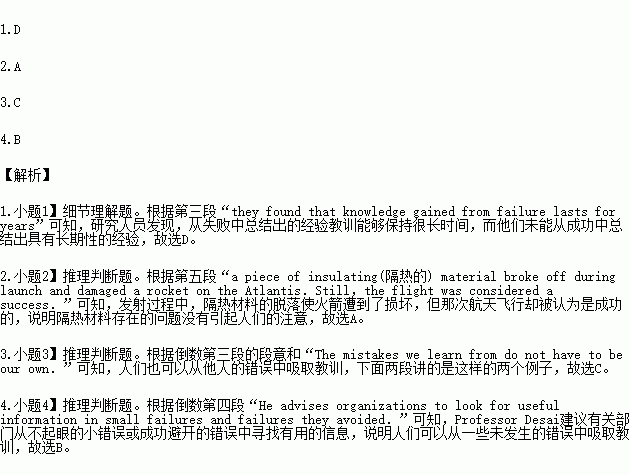题目内容
No one likes to make mistakes.But a new study says organizations learn more from their failures than from their successes,and keep that knowledge longer.
One of the researchers was Vinit Desai,an assistant professor at the University of Colorado Denver Business School.He worked with Peter Madsen from the Marriott School of Management at Brigham Young University in Utah.
They did not find much long-term "organizational learning" from success.It is possible,they say.But Professor Desai says they found that knowledge gained from failure lasts for years.He says organizations should treat failures as a learning opportunity and not try to ignore them.
The study looked at companies and organizations that launch satellites--and other space vehicles.Professor Desai compared two shuttle flights.
In two thousand two,a piece of insulating(隔热的) material broke off during launch and damaged a rocket on the Atlantis.Still,the flight was considered a success.
Then,in early two thousand three,a piece of insulation struck the Columbia during launch.This time,the shuttle broke apart on re-entry and the seven crew members died.NASA officials suspended all flights and an investigation led to suggested changes.
Professor Desai says the search for solutions after a failure can make leaders more open-minded.He points to airlines as an example of an industry that has learned from failures in the past.
He advises organizations to look for useful information in small failures and failures they avoided.He also urges leaders to encourage the open sharing of information.The study appeared in the Academy of Management Journal.
The mistakes we learn from do not have to be our own.We recently asked people on our Facebook page to tell us a time they had done something really silly.
Fabricio Cmino wrote: Not long ago I wanted to watch TV,but it wouldn't turn on,so I did everything I could to start it.Thirty minutes later my mum showed up and,passing by,said to me "Did you try plugging it'? I’m just dusting,Mum!”So she wouldn't notice how dumb I am sometimes!
Bruno Kanieski da Silva told about a time he looked everywhere for his key.It was in his pocket.He wrote: I always promise I will never do it again,but after-a few weeks,where is my wallet? For sure it will be in a very logical place.
1.What we get from failure differs from that from success in that_______.
A. what we learn from failure is more powerful
B. what we learn from success does no good to us
C. the knowledge gained from failure is important for a company
D. the knowledge gained from failure lasts longer
2.From the passage,we can infer that________.
A. The insulating material problem in 2002 didn't arouse enough attention
B. There were no astronauts on Columbia
C. In spite of the problem,Atlantis was considered a success
D. Columbia exploded during its launch time
3.The writer gives the last two paragraphs to show that________.
A. many people make mistakes in the world
B. mistakes were a very embarrassing thing when found by others
C. we can also draw a lesson from others' mistakes
D. making mistakes was a necessity
4.Which of the following is TRUE according to the passage?
A. Only organizations can learn from mistakes
B. We can also learn from failures that have been avoided.
C. Lessons from the shuttle flights are more important.
D. Leaders often lack an open mind and seldom share information.


 ll be harmful to health.
ll be harmful to health.